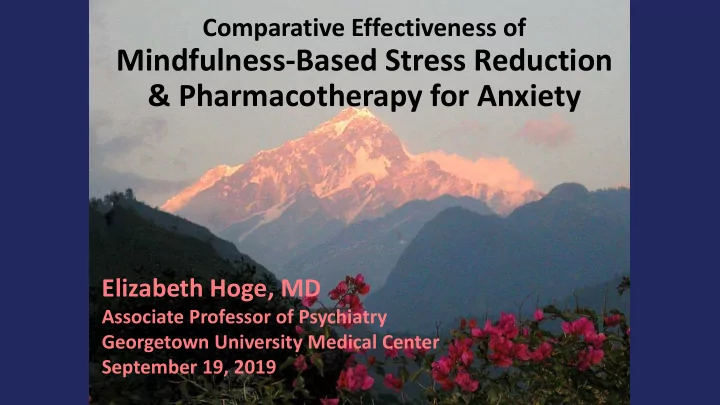

Comparative Effectiveness of Mindfulness-Based Stress Reduction & Pharmacotherapy for Anxiety Elizabeth Hoge, MD Associate Professor of Psychiatry Georgetown University Medical Center September 19, 2019
Elizabeth Hoge • Has nothing to disclose. 2
Talk Outline • What is Mindfulness Meditation? • Why would it be used with Anxiety Disorders? • Why compare it to a medication?
Mindfulness Meditation is Becoming Very Popular
What is Mindfulness Meditation? 1. Self-regulation of attention - maintained on immediate experience in the present moment (sensations, emotions, thoughts) 2. Adopt a particular orientation toward one’s experiences in the present moment, characterized by curiosity, openness, and acceptance Bishop et al, 2004, Clinical Psychol Sci Prac 11 (3): 230–241.
How does Mindfulness Meditation change thinking? • Learn to be aware of thoughts and feelings as “merely passing events of the mind rather than necessarily ….reflections of reality” (Ramel et al, 2004) • More acceptance of “what one cannot control” • Avoid getting pulled into action or absorbed in content of the thought
Example: Mindfulness Meditation to Treat Generalized Anxiety Disorder (GAD)
Psychiatric Diagnostic Criteria for GAD • Worry that is difficult to Control • 3 of these: – Restlessness or feeling keyed up or on edge – Being easily fatigued – Difficulty concentrating or mind going blank – Irritability – Muscle tension – Sleep disturbance (difficulty falling asleep or staying asleep, or restless, unsatisfying sleep) • Functional impairment and/or distress • Not due to other disorder/medical condition DSM-5. Washington, DC: American Psychiatric Association, 1994.
Mindfulness Meditation: Why might it be helpful for GAD? • Generalized Anxiety Disorder: Worrying serves an avoidance function (Borkovec et al., 2004) – patients worry to avoid experiencing negative emotions i.e. sadness, anger – Patients focus on the future rather than the present experience • With Mindfulness, one focuses on the present experience and accepting it (Roemer et al, 2006)
Lifetime Prevalence of Anxiety Disorders Kessler et al Arch Gen Psychiatry. 2005 Jun;62(6):593-602.
Mindfulness-Based Stress Reduction (MBSR) - Originally developed by Jon Kabat-Zinn and colleagues at the Univ. of Massachusetts - 8 weekly group sessions, 2.5 hour class with mindfulness practices - breath awareness noticing mental events with - hatha yoga curiosity, openness, acceptance - body-scan - 40 minutes daily mindfulness exercises at home - one weekend day retreat
What does previous research show? • Cochrane Database Systematic Review: “Meditation therapy might hold some promise… for patients with anxiety disorders, however the scarcity of randomised controlled trials… demand caution...” Cochrane Database Syst Rev. 2006 Jan25;(1):CD004998 .
What does previous research show? • Another review study noted: • “mindfulness meditation could have a non-specific effect compared to no treatment (such as a waiting list)… future studies should compare MM to a control group designed to be structurally equivalent to a meditation programme in terms of instructor attention, weekly and total duration…” (Chiesa et al 2010)
“ Firm conclusions on the effects of meditation …cannot be drawn…special attention should be paid to developing studies that provide a more accurate assessment of the efficacy and effectiveness of meditation practices, both against standard therapies and against each other ” Agency for Healthcare Research and Quality, U.S. Department of Health and Human Services, Publication No. 07-E010, June 2007
You mean, meditation versus medication?
Clinical Trial Requirements for Rigorous Methodology • Randomized • Controlled • Blinding - we use single-blind raters for clinical symptoms • Standard statistical analysis • Multi-site coordination (i.e. interrater reliability)
Mindfulness-Based Stress Reduction (MBSR) - 8 weekly group sessions, 2.5 hour class with mindfulness practices - breath awareness noticing mental events with - hatha yoga curiosity, openness, acceptance - body-scan - 40 minutes daily mindfulness exercises at home - one weekend day retreat
TAME: Treatments for Anxiety: Meditation and Escitalopram Georgetown, NYU, Massachusetts General, N=368
TAME: Treatments for Anxiety: Meditation and Escitalopram Primary Outcome Measurement: Clinical Global Assessment of Severity by Blinded Clinician Assessors; Hypothesis: Non- Inferiority between Meditation and Drug Other Outcomes: Treatment satisfaction, side effect burden, sleep quality, occupational functioning
Input f from Patients a and o other S Stakeholders Patient Panel • Advised us on recruitment strategies: tear-off ads, decided against radio ads, created interior bus ads, gym flyers, suggested social media sites (Instagram, etc) • Advised us to measure the effects of treatment of different groupings of anxiety symptoms such as disorder specific scales • Advised us to have a possibility for study visits to be conducted over the phone, if needed to be more convenient for patients Stakeholder Panel (Healthcare systems, Payors, Private Practice, Patient Advocacy) • Asked us to consider that a history of trauma (even without PTSD) could have an interaction effect in the treatment outcome - We added trauma experience questionnaires to capture these data • Payor representative noted that effect of symptoms on work performance would be important to measure
Thank you very much for your attention!
Recommend
More recommend